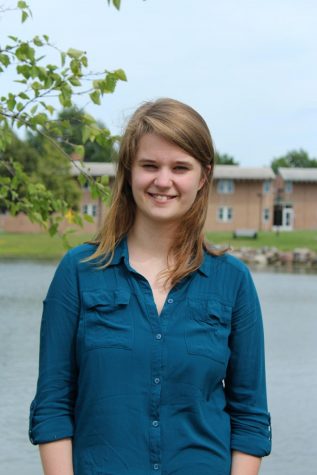Editorial: Searching in the dark for OU’s new pres

After nearly 10 months of waiting since former Oakland University President Gary Russi resigned from the position following an 18-year reign, the word is finally out on OU’s new president.
The word: secrecy.
Since forming the Ad Hoc Presidential Search Committee and approving R. William Funk & Associates as the official presidential search firm in December 2013, the Oakland University Board of Trustees has held three public meetings and an untold number of private meetings, interviewing and pursuing contenders to be the next leader of the Golden Grizzlies.
On Monday, June 2, Chairman of the Board Michael Kramer sent an email announcement to OU faculty stating that “extensive open campus forums will not be part of the ongoing process … the Board of Trustees will make the final selection of the next Oakland University President from the set of finalists presented by the search committee.”
The email defended the decision in the name of the “candidates’ desires to maintain confidentiality, as all of the finalists are presently employed elsewhere.”
“I am sure we can all agree that we do not want to eliminate an outstanding candidate who is perfectly happy in and does not want to risk his or her current position,” wrote Kramer.
The Michigan Open Meetings Act defines itself as an act implemented to “require certain meetings of certain public bodies to be open to the public; to require notice and the keeping of minutes of meetings; to provide for enforcement; to provide for invalidation of governmental decisions under certain circumstances; to provide penalties; and to repeal certain acts and parts of acts.”
In other words, the public has the right to attend any and all government meetings — including state-funded universities such as OU.
However, after the Federated Publications, Inc. v. Board of Trustees of Michigan State University case in 1999 involving the closed-door presidential-picking policies at MSU, the act was amended, exempting informal meetings of regents of Michigan universities from MOMA.
Technically, the OU board is in the right.
Amendments aside, however, we at The Oakland Post believe the closed meetings, secrecy and the opaque nature of this search are fundamentally and ethically wrong.
According to Rochester Hills Finance Director Keith Sawdon, at press time, the total citywide budget for the 2014 fiscal year for the city of Rochester Hills amounted to $129,440,980. In order to lead a city with this budget, current Rochester Hills mayor Bryan Barnett was elected through a popular vote, complete with meetings, debates and interviews open to the public.
For the 2013 fiscal year, Oakland University’s revenue budget amounted to $221,417,394, according to the university website. Managing a budget nearly double that of its neighboring city, OU’s next president has some serious power.
However, there will be no public elections and no extensive public forums regarding the final choice of the next manager of this $221,417,394.
According to Kramer’s latest email, the choice for the next president will be made behind closed doors by the board of trustees, eight individuals appointed — not elected — by Gov. Rick Snyder.
Now, we are not dismissing nor criticizing the capabilities or qualifications of those on the BOT. The board consists of highly distinguished community and business leaders: CEOs, lawyers and businesspeople with degrees in higher education. Their pedigrees speak for themselves.
We are, however, questioning the board’s choice to keep the search under wraps, operating in a vacuum without anywhere close to proportionate representation from one of the university’s major stakeholders — its students.
In fact, according to OU’s general fund budget for the 2013 fiscal year, our students’ tuition accounts for 81 percent of the school’s $221,417,394, or $179,348,089.14, to be exact.
Eighty-one percent of the school’s monetary power is represented by a singular student — senior and former Student Body President Brandon Hanna — on the 12-member presidential search committee. The 12 representatives also include an OU distinguished alumnus, two administrators, three faculty members and five members of the board of trustees.
With only one student even remotely involved in any of this selection process of the university’s next leader, we at The Oakland Post believe the least OU could do is allow a bit of transparency in the matter.
What is there to hide?
Yes, under the OMA, Michigan public universities are technically permitted to pursue presidential picks in this clandestine fashion. However, the level of secrecy around the search is left to the discretion of the individual institution.
In fact, Northern Michigan University, another four-year public university, also recently conducted a presidential search, announcing Dr. Fritz Erickson as the choice on April 22.
The difference? Openness.The entire search was conducted with transparency, with a timeline of the search displayed on the university’s website along with profiles of the four final candidates.
Kramer’s email posits the “candidates’ desires to maintain confidentiality, as all of the finalists are presently employed elsewhere” as justification for OU’s furtive ways. But Dr. Erickson was in fact employed as the provost and vice president for academic affairs at Ferris State University during the time of NMU’s presidential search. In fact, all of the final candidates in Northern Michigan’s search were currently employed in administrative roles at other universities.
So what makes OU different? Why is the search for the potentially most important leader of our school being conducted in the dark? What lurks in the shadows of the board of trustee’s decision?
It’s time to come out of hiding, OU, time to clue the students, staff and faculty in on their next leader. After all, he or she will be the face of us all.
It’s time, OU, to stop hiding in the darkness and turn on the light.
The staff editorial is written by the members of The Oakland Post’s editorial board.









